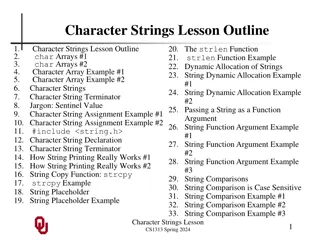Gerald Croft: A Complicated Character Analysis
Gerald Croft, an eligible bachelor from an old county family, appears respectable and upper-class but also reveals traits of being a liar and traditional. Similar to Mr. Birling, he shares jokes, is comfortable in control, and supports questionable actions. However, by the end of the play, Gerald shows his selfish and stubborn nature, failing to learn from his mistakes and representing the selfish attitudes of the upper class.
Download Presentation

Please find below an Image/Link to download the presentation.
The content on the website is provided AS IS for your information and personal use only. It may not be sold, licensed, or shared on other websites without obtaining consent from the author. Download presentation by click this link. If you encounter any issues during the download, it is possible that the publisher has removed the file from their server.
E N D
Presentation Transcript
Gerald Croft An eligible bachelor
Character Profile Gets on well with Mr Birling, seems like the perfect son-in-law From an old county family, which makes him a social superior Birling and Company and Crofts Limited are friendly rivals Relaxed and comfortable in the company unlike Eric, and shares jokes with Birling on politics, women and getting into trouble
Traits Respectable: the easy well-bred young man- about- town Upper-class: landed people and so forth A liar: I wasn t telling you a complete lie Traditional: I should say so! (Gerald agreeing with Birling)
How Gerald is so Alike to Mr Birling Shares jokes with Birling on politics, women and getting into trouble He s used to and comfortable with being in control Supports Mr Birling s sacking of Eva Smith- You couldn t have done anything else. He and Arthur are the ones who are determined to take action at the end to find out whether the Inspector or the girl were real
Gerald at the End of the Play First character to use the word hoax - he s very keen to prove the Inspector was a fake and clear everyone's names Everything's alright now, Sheila tries to comfort her. Also shows he hasn t learnt any lessons He left Daisy and went on a business trip, effectively making her homeless Confident but stubborn- he doesn t learn much about himself over the course of the play He played a key part in the chain of events , contributing to the death of Eva Smith. He doesn't change his attitudes, conveying how ingrained these attitudes were in the upper class, and how difficult it was to change them. He represents the selfish attitudes of the upper class.
Key Quotes At the start of the play, he cannot see how he could be involved in Eva Smith s (Daisy Renton s) suicide. I don t come into this suicide business. He tries to hide the truth from the Inspector (that he had been involved with Eva/Daisy) from the start, ( we can keep it from him ) but Sheila criticises this. She noticed how he reacted when he heard the name Daisy Renton . Gerald met Daisy Renton in the Palace Bar. He rescued her from Aldermand Meggarty and felt sorry for her. He kept her as his mistress for a few months but it eventually came to an end. He was aware that Daisy Renton s feelings towards him were stronger than his were towards her The Inspector isn t as harsh on him as he is on Mr and Mrs Birling He had some affection for her and made her happy for a time When he starts to talk about her death, he appears genuinely upset and goes out for a walk: I m rather more upset by this business than I probably appear to be . The audience assume that he has learned his lesson and that perhaps he will change for the better. After all, he had initially acted out of kindness, which suggests that he is not a completely bad character; however, he gave in to lust and cheated on Sheila, dropping Daisy Renton when it suited him so he is far from faultless. When he returns, he has news: the Inspector was an impostor. He returns to the way he was before; the fact that he still did what he did does not make him change like Sheila and Eric. When offering Sheila the ring back, she can t take it. Everything s all right now Sheila. (Holds up the ring.) What about this ring? She replies, It s too soon. I must think. She needs him to change his attitude and take responsibility for his actions. He forgets how poorly he treated Sheila and Daisy/Eva.
Summary He is described as "an attractive chap about thirty, rather too manly to be a dandy but very much the easy well- bred man-about-town." He is an aristocrat - the son of Lord and Lady Croft. We realise that they are not over-impressed by Gerald's engagement to Sheila because they declined the invitation to the dinner. He is not as willing as Sheila to admit his part in the girl's death to the Inspector and initially pretends that he never knew her. Is he a bit like Mr Birling, wanting to protect his own interests? He did have some genuine feeling for Daisy Renton, however: he is very moved when he hears of her death. He tells Inspector Goole that he arranged for her to live in his friend's flat "because I was sorry for her;" she became his mistress because "She was young and pretty and warm-hearted - and intensely grateful." Despite this, in Act 3 he tries to come up with as much evidence as possible to prove that the Inspector is a fake - because that would get him off the hook. It is Gerald who confirms that the local force has no officer by the name of Goole, he who realises it may not have been the same girl and he who finds out from the infirmary that there has not been a suicide case in months. He seems to throw his energies into "protecting" himself rather than "changing" himself (unlike Sheila). At the end of the play, he has not changed. He has not gained a new sense of social responsibility, which is why Sheila (who has) is unsure whether to take back the engagement ring.























